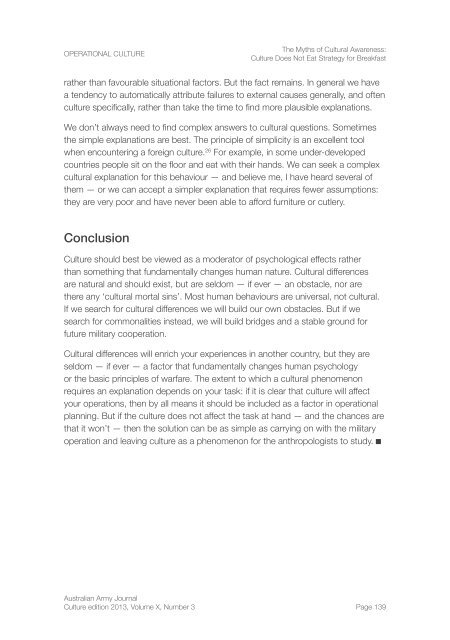Australian Army Journal
Australian Army Journal
Australian Army Journal
You also want an ePaper? Increase the reach of your titles
YUMPU automatically turns print PDFs into web optimized ePapers that Google loves.
OPERATIONAL CULTURE<br />
The Myths of Cultural Awareness:<br />
Culture Does Not Eat Strategy for Breakfast<br />
rather than favourable situational factors. But the fact remains. In general we have<br />
a tendency to automatically attribute failures to external causes generally, and often<br />
culture specifically, rather than take the time to find more plausible explanations.<br />
We don’t always need to find complex answers to cultural questions. Sometimes<br />
the simple explanations are best. The principle of simplicity is an excellent tool<br />
when encountering a foreign culture. 26 For example, in some under-developed<br />
countries people sit on the floor and eat with their hands. We can seek a complex<br />
cultural explanation for this behaviour — and believe me, I have heard several of<br />
them — or we can accept a simpler explanation that requires fewer assumptions:<br />
they are very poor and have never been able to afford furniture or cutlery.<br />
Conclusion<br />
Culture should best be viewed as a moderator of psychological effects rather<br />
than something that fundamentally changes human nature. Cultural differences<br />
are natural and should exist, but are seldom — if ever — an obstacle, nor are<br />
there any ‘cultural mortal sins’. Most human behaviours are universal, not cultural.<br />
If we search for cultural differences we will build our own obstacles. But if we<br />
search for commonalities instead, we will build bridges and a stable ground for<br />
future military cooperation.<br />
Cultural differences will enrich your experiences in another country, but they are<br />
seldom — if ever — a factor that fundamentally changes human psychology<br />
or the basic principles of warfare. The extent to which a cultural phenomenon<br />
requires an explanation depends on your task: if it is clear that culture will affect<br />
your operations, then by all means it should be included as a factor in operational<br />
planning. But if the culture does not affect the task at hand — and the chances are<br />
that it won’t — then the solution can be as simple as carrying on with the military<br />
operation and leaving culture as a phenomenon for the anthropologists to study.<br />
<strong>Australian</strong> <strong>Army</strong> <strong>Journal</strong><br />
Culture edition 2013, Volume X, Number 3 Page 139

















